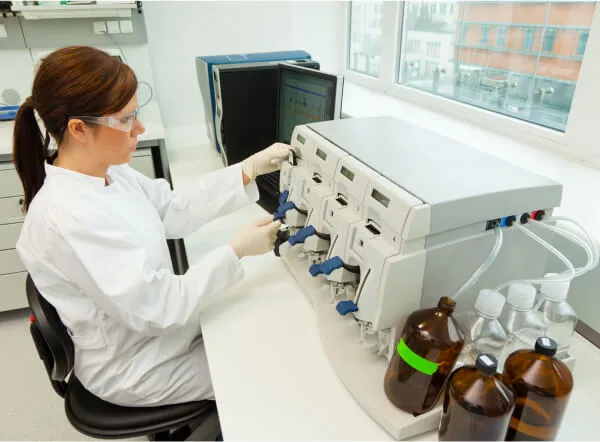Molecular Genetics

Molecular genetics combines the study of genes with molecular biology to explore the causes of many serious diseases. Learn about education requirements, job options, employment outlook and salary to make an informed career decision.
<h2 id="section---IsMolecularGeneticsForMe">Is Molecular Genetics for Me?</h2>
<h3 id="section---CareerOverview">Career Overview</h3>
<p>A gene is a hereditary unit that is responsible for a specific organism's characteristics. It is a DNA sequence and found on a chromosome in a specific place. Molecular <a href="https://learn.org/articles/Genetics_Major_Your_Questions_Answered.html">genetics</a> is the scientific study of genes. A molecular geneticist may conduct research in genetic disorders or genetic manipulation. Professionals who pursue careers in research need to have good communication skills, as well as patience and self-discipline.
</p>
<h3 id="section---JobPossibilities">Job Possibilities</h3>
<p>Which careers in molecular <a href="https://learn.org/articles/Animal_Genetics_Your_Degree_and_Course_Questions_Answered.html">genetics</a> may be open to you depends on the level of education that you achieve. Degrees in molecular genetics are offered at the bachelor's, master's and doctorate levels. A Ph.D. in Molecular Genetics would allow you to work as a researcher in academia or with a <a href="https://learn.org/articles/Biotechnology_Major_Your_Career_and_Salary_Questions_Answered.html">biotechnology</a> firm or private research institute.
</p>
<p>If you would like to work in a genetics lab, you would need a master's degree for a position as a genetic lab <a href="https://learn.org/articles/Research_Assistant_Courses_and_Training_Programs_FAQs.html">research assistant</a> or a bachelor's and/or master's for a technician job. A molecular genetic tech studies genes and DNA for purposes such as parentage determination, identification of victims of crime or disasters, tissue matching (organ transplantation) or neurological disorder diagnoses.
</p>
<h3 id="section---EmploymentOutlookAndSalaryStatistics">Employment Outlook and Salary Statistics</h3>
<p>According to the U.S. Bureau of Labor Statistics (BLS), there were 31,080 biological scientists, 18,550 <a href="https://learn.org/articles/Microbiologist_Career_Profile_Job_Outlook_and_Education_Requirements.html">microbiologists</a> and 95,420 medical scientists (<i>www.bls.gov</i>) in 2012. The BLS projected that between 2012 and 2022, employment would increase 7% for microbiologists and 13% for <a href="https://learn.org/articles/Medical_Scientist_Career_and_Salary_FAQs.html">medical scientists</a>. The BLS does not have specific employment figures for biological scientists, in general.
</p>
<p>As of May 2013, the BLS reported that the median annual salary for microbiologists was $67,840 and for <a href="https://learn.org/articles/Biological_Scientist_Your_Career_and_Salary_Questions_Answered.html">biological scientists</a>, $72,720. It reported that medical scientists made a median annual salary of $79,840 that same year.
</p>
<h2 id="section---HowCanIWorkInMolecularGenetics">How Can I Work in Molecular Genetics?</h2>
<h3 id="section---UndergraduateEducation">Undergraduate Education</h3>
<p>Many undergraduate degrees in molecular genetics are joint degrees with another discipline such as <a href="https://learn.org/articles/Biology_Become_a_Biologist_in_5_Steps.html">biology</a>. You may start your career by earning a bachelor's degree in molecular <a href="https://learn.org/articles/Genetics_Degree_Program_FAQs.html">genetics</a>, biology or biology with a concentration in cell and <a href="https://learn.org/articles/Molecular_Biology_Degree_and_Certificate_Programs_FAQs.html">molecular biology</a>. At the undergraduate level, you study biology, chemistry, physics, molecular biology, calculus and statistics. You may also take classes in biometry, microbial genetics, virology and immunology.
</p>
<p>With this degree, you could pursue jobs in <a href="https://learn.org/articles/What_are_Some_High-Paying_Biology_Professions.html">biology</a> that include entry-level positions in scientific research in areas like biotechnology, <a href="https://learn.org/articles/What_is_Forensics.html">forensics</a> or pharmaceutical manufacturing, along with teaching biology in high school. A graduate may also go on to earn a professional degree in medicine, <a href="https://learn.org/articles/What_Can_I_Do_with_an_Associates_Degree_in_Veterinary_Medicine.html">veterinary medicine</a> or dentistry, or a master's and/or Ph.D.
</p>
<h3 id="section---GraduateStudies">Graduate Studies</h3>
<p>At the graduate level, master's and doctoral degree programs in molecular genetic are combined programs with another discipline, such as microbiology or <a href="https://learn.org/articles/What_is_the_Typical_Curriculum_for_a_Biochemistry_Degree_Program.html">biochemistry</a>. You engage in labs, conduct independent research and take advanced lectures. Your coursework may address <a href="https://learn.org/articles/Cancer_Biology_Programs_and_Courses_Answers_to_Your_Questions.html">cancer</a> and its genetic, cellular and molecular basis, tumorigenesis, molecular genetics, immunology and molecular oceanography. You may decide on a teaching and research career in academia or a research career in industry.</p>


.svg)